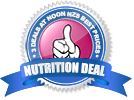Eating And Drinking For Sports
- 20 December 2018
Getting the best performance out of your body means you have to take great care of it and make sure you, the athlete can produce a jaw-dropping performance when needed.
More Exercise, More Food
As a sportsperson, you are probably training almost every day, this advice on nutrition is for you. Your energy levels have to be kept up, and your target weight maintained so a healthy balanced diet is needed.
More carbohydrate rich foods are needed when you are training every day, so food such as bread, rice, cereals, rice, potatoes and pasta are ideal.
Try to eat more of the wholegrain varieties when you can. Don't forget to include essential fats from foods such as oily fish, nuts and seeds and protein-rich foods to help repair and build your muscles.
Carbs And Protein
Carbs are the fuel for your muscles but your body only stores small amounts at a time. Carbs are stored as glycogen in the muscles and liver and when the levels get low there is an increased risk of injuries as well as a drop in your performance, so make sure you have a top up source available during workouts.
Protein helps the muscles grow and repair and is available in foods such as meat, fish, dairy products and eggs, again, you will need to have a source available to top up if you are on a long training day.
From Food To Exercise
The experts recommend that if you eat a main meal then you should allow 2 to 3 hours between finishing the meal and working out. Snacks should be rich in carbohydrates, low in fat and moderate in protein as too much fat or protein can slow you down and cause stomach discomfort. Snacks should be taken an hour before exercise.
Drinking while Exercising
Keeping well hydrated is really important in any high instance where there is high-intensity physical activity. Dehydration can seriously affect our performance so regular drinks are needed. The rule is the more you sweat, the more you need to drink, this isn't just about work, it's about environmental conditions and length of activity as well. If your sport lasts more than an hour then swap the water for a drink containing carbohydrates and electrolytes for better performance.
Different Goals, Different Diets
One athlete's goal is to gain muscle mass, another wants to lose weight.
Diets are pretty specific to the person's individual targets, losing weight means less fat, less alcohol, less sugary food and drinks and more meals of small proportions that are rich in complex carbohydrates like whole grain bread, rice etc.
You may want to lose weight but not the muscle mass so keep the protein intake up to avoid losing that.
For the muscle building athlete, you will need strength training with a diet rich in carbs and protein as well as the essential fat given by oily fish, seeds and nuts. Carbs are your fuel, protein your muscle builders, plan your diets and stick to them to maximise your results.
Food for Recovery
Food and drink also plays a vital role in recovery. Good recovery is important so you don't lose your energy halfway through the week and to help muscle growth and repair. For pro-athletes who are training more than once a day, and have less than eight hours from the end of one workout to the beginning of the next, then ideally have carbohydrate and protein filled food or drink within about half an hour to an hour of completing the initial session. For those with more time to recover then eating as soon possible is perfect.
There are of course supplements available to help you reach goals and provide may of the nutritional needs to compliment your normal healthy diet. If you have any concerns or questions please feel free to contact us.
